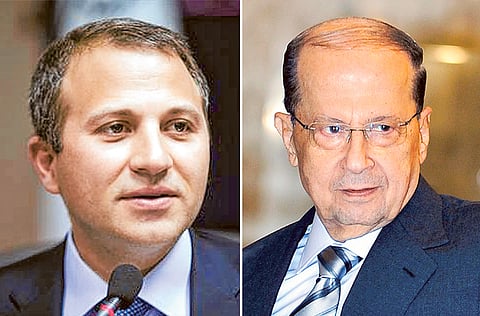Lebanon: ‘To bargain, to serve’
Lebanese officials hone bargaining skills in bazaar that aspires to form a government

Beirut: A 48-hour deadline passed without any compromises for Prime Minister-designate Tammam Salam to finally form his carefully vetted unity government.
Under the 8-8-8 line-up that allowed March 14 and March 8 coalitions to have 8 posts each (with the remaining 8 allocated to centrists), Lebanon was slated to move ahead without granting any group veto powers within the Cabinet.
The compromises, which allegedly occurred after the opposition leader Sa’ad Hariri accepted a painstakingly negotiated Saudi-Iranian formula, faced a far greater challenge than originally contemplated after the Free Patriotic Movement (FPM) rejected a portfolio rotation that saw current Caretaker Energy Minister Gebran Bassil, a son-in-law of party leader Michel Aoun, loose his post.
In a blatant sectarian pronouncement on Sunday, Bassil insisted that the Energy Ministry was important to Lebanon’s future and to Christians in particular, when he declared: “Lebanon’s oil is being targeted and we refuse to [let] the oil portfolio [be taken away], because we are worried about its [future].”
“Oil is a guarantee for stability and ... a new guarantee for the Christians,” he continued, which shocked observers since no one in the country’s recorded history absconded its resources to a particular religious community.
In the event, an unnamed FPM official told the Al Safir daily that the obstacle to the cabinet formation was Salam himself, allegedly because he favoured the rotation of portfolios. Given that the energy, telecommunications and justice ministers — all of which were currently led by FPM ministers — would switch parties, Aoun opted to stall the formation of an all-embracing 24-member government.
On Monday, the otherwise poised Salam displayed his irritation, affirming that the process was not a mere “hobby or a waste of time.”
“It requires strong efforts and a responsibility by all,” he clarified, before he added:
“Where is the logic in having a single party standing against the agreement?”
Even more forcefully, Salam did not mince his words when he stated: “Should we stop the country and its interests based on the wishes and demands of a single person and a specific portfolio?”
Salam took umbrage at various reports that claimed he threatened to form a fait accompli government, as he told the pro-Hezbollah Al Akhbar daily on Tuesday: “It’s not me who is threatening. On the contrary, the time factor is threatening me and threatening all of us amid an unstable situation and bombings,” as he warned that events on the ground could quickly go out of control and Lebanon could easily fall in a Sunni-Shi‘ah strife.
“These are the true deadlines that are threatening us ... [and] it seems that the Free Patriotic Movement is not viewing these threats,” he concluded.
The Prime Minister-designate did not say it so explicitly, though, part of his frustration emanated from the monopoly of the Christian voice within parliament because of the FPM’s 28-seats block, which overlooked 36 other Christian parliamentarians.
In other words, while the FPM and Aoun played a vital role, centrist Christians and those that supported March 14 held a numeric majority even if their voices were not always heard.
The dilemma arose because Maronite Church leaders repeatedly goaded politicians into impossible situations, ostensibly to demand proper Christian representation.
“No one can be excluded from the cabinet and experience proved that eliminating others will increase the crisis and not resolve it,” Maronite Bishop Boulos Sayyah told the Al Jumhuriyah daily on Monday.
Sayyah considered that any cabinet formed without Christians would be deemed “unconstitutional,” but this was a false as well as a gratuitous statement since President Michel Sulaiman and Prime Minister-designate Salam could not proceed along such unconstitutional lines. Moreover, there was no reason to believe that 12 out of the 24 ministers in the 8-8-8 formula, would not be Christians.
Sadly, the cleric’s sectarian rhetoric was about the political affiliation of the 12 Christian ministers, as both Sulaiman and Salam were not about to ignore the religious parity imposed by the Taif Accords.
Another Bishop, Samir Mazlum, told Al Safir that the Maronite Patriarchate considered that Christians should be represented “properly” in the upcoming cabinet, which meant FPM Christians.
President Sulaiman gave the March 8 alliance until Wednesday to inform him of its final decision.
“I had previously set January 7 and informed all the officials that I would sign the decree of the government in hopes that it would be based on the 8-8-8 formula,” he reiterated on Monday, though he updated his own deadlines several times to allow for behind-the-scenes negotiations.
If the reply was still negative by Wednesday, one assumed that the head-of-state would revert to his choice for a neutral cabinet that, presumably, threatened to plunge the country into yet another crisis.
According to an Al Liwaa newspaper report on Tuesday, it was precisely to avoid such an outcome that Hezbollah leader Sayyid Hassan Nasrallah telephoned Michel Aoun, ostensibly to persuade his partner that the Energy portfolio was not all that vital. Aoun refused to give up the energy and telecommunications portfolios though intensive bargainings were under way in the Lebanese bazaar.
Sign up for the Daily Briefing
Get the latest news and updates straight to your inbox



